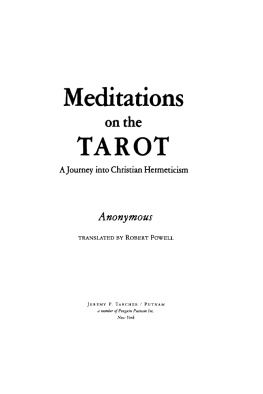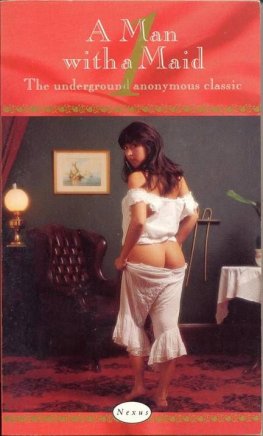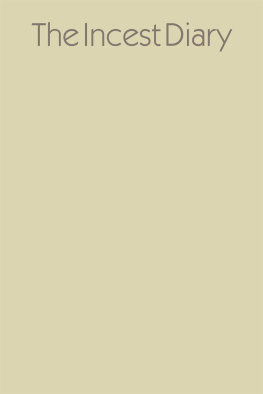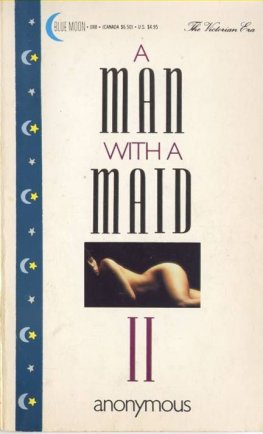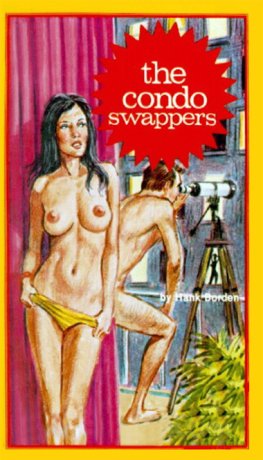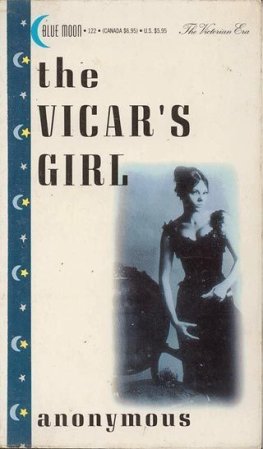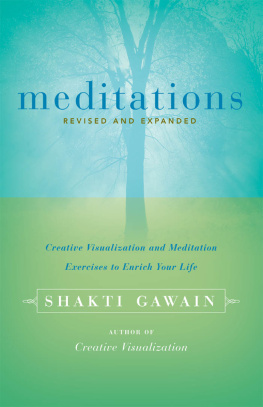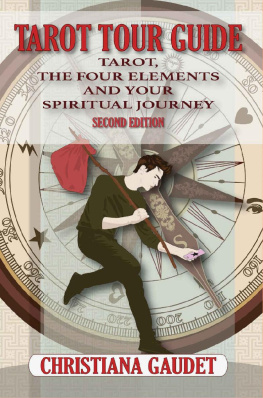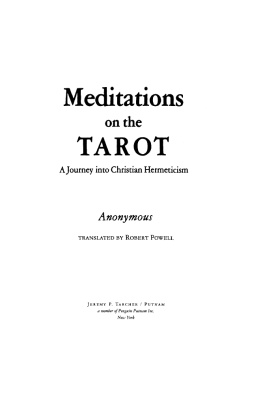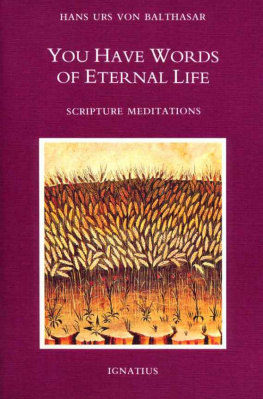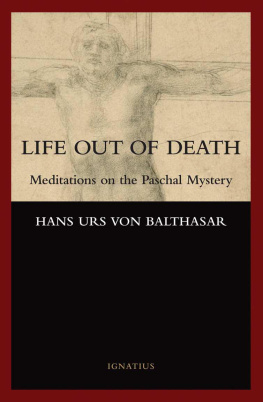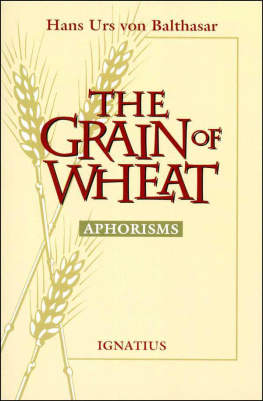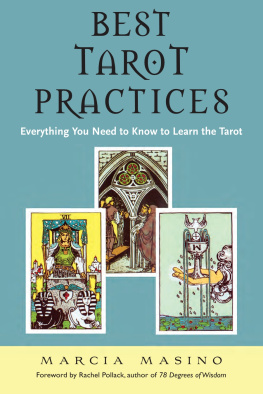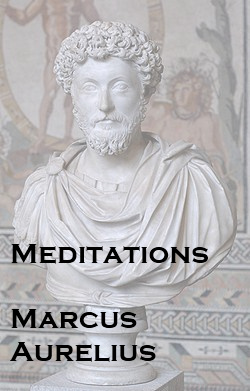MEDITATIONS ON THE TAROT
Meditations
on the
TAROT
A Journey into Christian Hermeticism
Anonymous
TRANSLATED BY R OBERT P OWELL


J EREMY P. T ARCHER /P ENGUIN
Published by the Penguin Group
Penguin Group (USA) LLC
375 Hudson Street
New York, New York 10014

USA * Canada * UK * Ireland * Australia
New Zealand * India * South Africa * China
penguin.com
A Penguin Random House Company
Originally published in French in 1980 by Aubier Montaigne.
Originally published in English in 1985 by Amity House.
First Jeremy P. Tarcher edition 2002.
Copyright 1985 by Martin Kriele
English translation of text and afterword 1985, 2002 by Robert Powell
Penguin supports copyright. Copyright fuels creativity, encourages diverse voices, promotes free speech, and creates a vibrant culture. Thank you for buying an authorized edition of this book and for complying with copyright laws by not reproducing, scanning, or distributing any part of it in any form without permission. You are supporting writers and allowing Penguin to continue to publish books for every reader.
Most Tarcher/Penguin books are available at special quantity discounts for bulk purchase for sales promotions, premiums, fund-raising, and educational needs. Special books or book excerpts also can be created to fit specific needs. For details, write: Special.Markets@us.penguingroup.com.
Library of Congress Cataloging-in-Publication Data
Meditations on the tarot: a journey into Christian hermeticism / Anonymous; translated by Robert Powell.
p. cm.
Originally published: 1985.
Included bibliographical references.
ISBN: 978-1-101-65785-0
1. Tarot. 2. Hermeticism. 3. Powell, Robert, date.
BF1879.T2 M48 2002 2001059016
133.32424dc21
This edition is dedicated to
Our Lady of Chartres
Foreword
These meditations on the Major Arcana of the Tarot are Letters addressed to the Unknown Friend. The addressee in this instance is anyone who will read all of them and who thereby acquires definite knowledge, through the experience of meditative reading, about Christian Hermeticism. He will know also that the author of these Letters has said more about himself in these Letters than he would have been able to in any other way. No matter what other source he might have, he will know the author better through the Letters themselves.
These Letters were written in French because in Francesince the eighteenth century until the present timethere exists a literature on the Tarot, a phenomenon which is found nowhere else. On the other hand, there existed in Franceand it still persistsa continuous tradition of Hermeticism, in which is united a spirit of free research with one of respect for the tradition. The purpose of these Letters therefore will be to incarnate into this tradition, i.e. to become an organic part of it, and in this way to contribute support to it.
As these Letters are intended only to serve, to sustain, and to support the Hermetic traditionfrom its first appearance in the epoch of Hermes Trismegistus, lost in the remoteness of antiquity and become legendarythey are a definite manifestation of this millennium-old current of thought, effort, and revelation. Their aim is not only to revive the tradition but also, and above all, to immerse the reader (or rather the Unknown Friend) in this currentbe it temporarily or for ever. For this reason the numerous citations of ancient and modern authors which you will find in these Letters are not due to literary considerations, nor to a display of erudition. They are evocations of the masters of the tradition, in order that they may be present with their impulses of aspiration and their light of thought in the current of meditative thought which these Letters on the twenty-two Major Arcana of the Tarot represent. For these are in essence twenty-two spiritual exercises, by means of which you, dear Unknown Friend, will immerse yourself in the current of the living tradition, and thus enter into the community of spirits who have served it and who are still serving it.
And the citations in question only serve the aim of a relief setting for this community. For the links in the chain of the tradition are not thoughts and efforts alone; they are above all living beings who were thinking these thoughts and willing these efforts. The essence of the tradition is not a doctrine, but rather a community of spirits from age to age.
There remains nothing more to say in this introduction to the Letter-Meditations on the Tarot, because all other questions concerning them will find a response in the Letters themselves.
Your friend greets you, dear Unknown Friend,
from beyond the grave.
Meditation on the
First Major Arcanum of the Tarot
THE MAGICIAN
LE BATELEUR
Spiritus ubi vult spirat: et vocem
ejus audis, sed nescis unde veniat,
aut quo vadat: sic est omnis,
qui natus est ex spiritu.
(John iii, 8)
The wind blows where, it wills, and
you hear the sound of it, but you do
not know whence it comes or whither
it goes; so it is with every one
who is born of the Spirit.
(John iii, 8)
Into this happy night
In secret, seen of none,
Nor saw I aught,
Without other light or guide,
Save that which in my heart did burn.
(St. John of the Cross)
LETTER I

THE MAGICIAN
Dear Unknown Friend,
The words of the Master cited above have served me the key for opening the door to comprehension of the first Major Arcanum of the Tarot, The Magician, which is, in turn, the key to all the other Major Arcana. This is why I have put them as an epigraph to this Letter. And then I have cited a verse from the Songs of the Soul of St. John of the Cross, because it has the virtue of awakening the deeper layers of the soul, which one has to appeal to when the concern is the first Arcanum of the Tarot and, consequently, all the Major Arcana of the Tarot. For the Major Arcana of the Tarot are authentic symbols, i.e. they are magic, mental, psychic and moral operations awakening new notions, ideas, sentiments and aspirations, which means to say that they require an activity more profound than that of study and intellectual explanation. It is therefore in a state of deep contemplationand always ever deeperthat they should be approached. And it is the deep and intimate layers of the soul which become active and bear fruit when one meditates on the Arcana of the Tarot. Therefore this night, of which St. John of the Cross speaks, is necessary, where one withdraws oneself in secret and into which one has to immerse oneself each time that one meditates on the Arcana of the Tarot. It is a work to be accomplished in solitude, and is all the more suitable for recluses.
The Major Arcana of the Tarot are neither allegories nor secrets, because allegories are, in fact, only figurative representations of abstract notions, and secrets are only facts, procedures, practices, or whatever doctrines that one keeps to oneself for a personal motive, since they are able to be understood and put into practice by others to whom one does not

